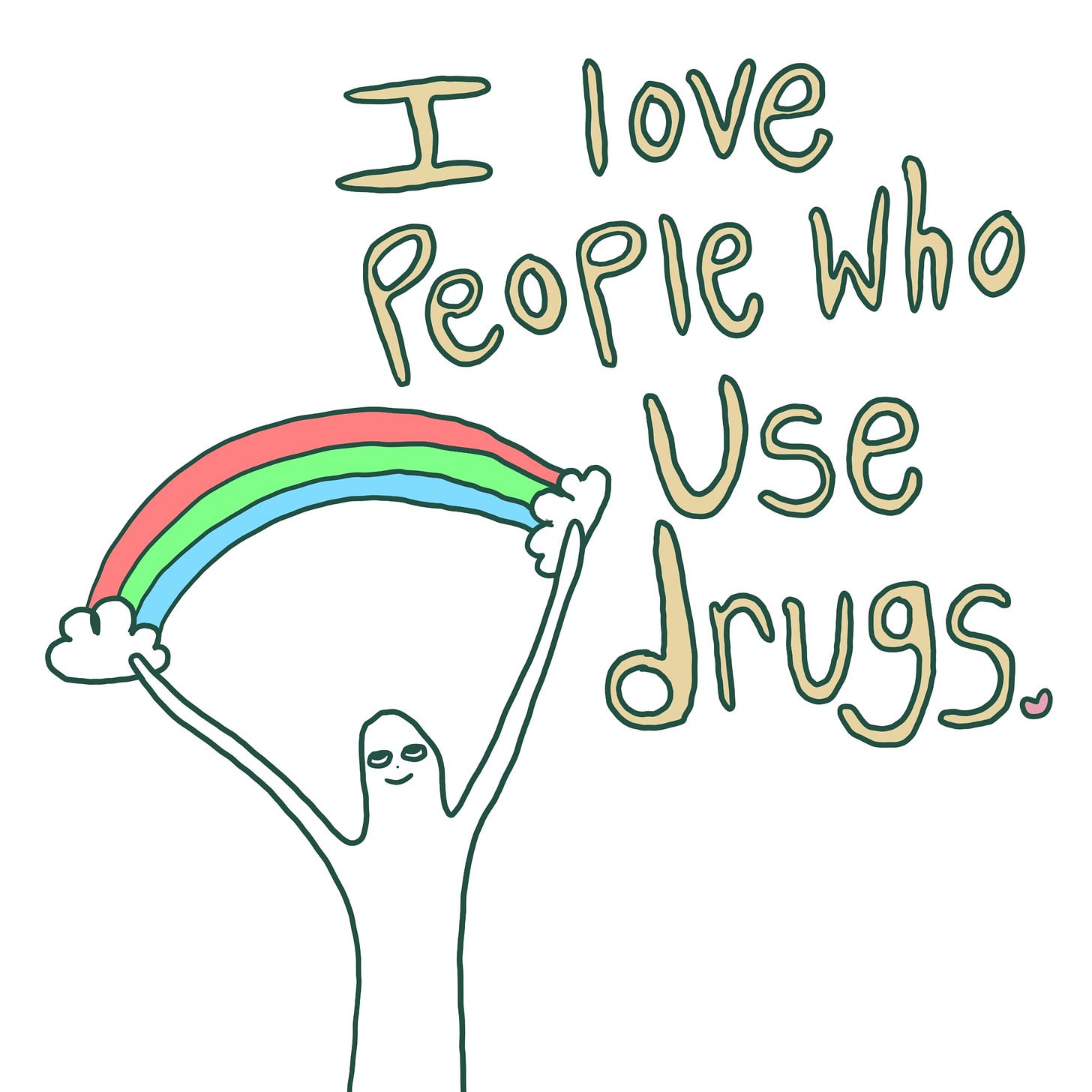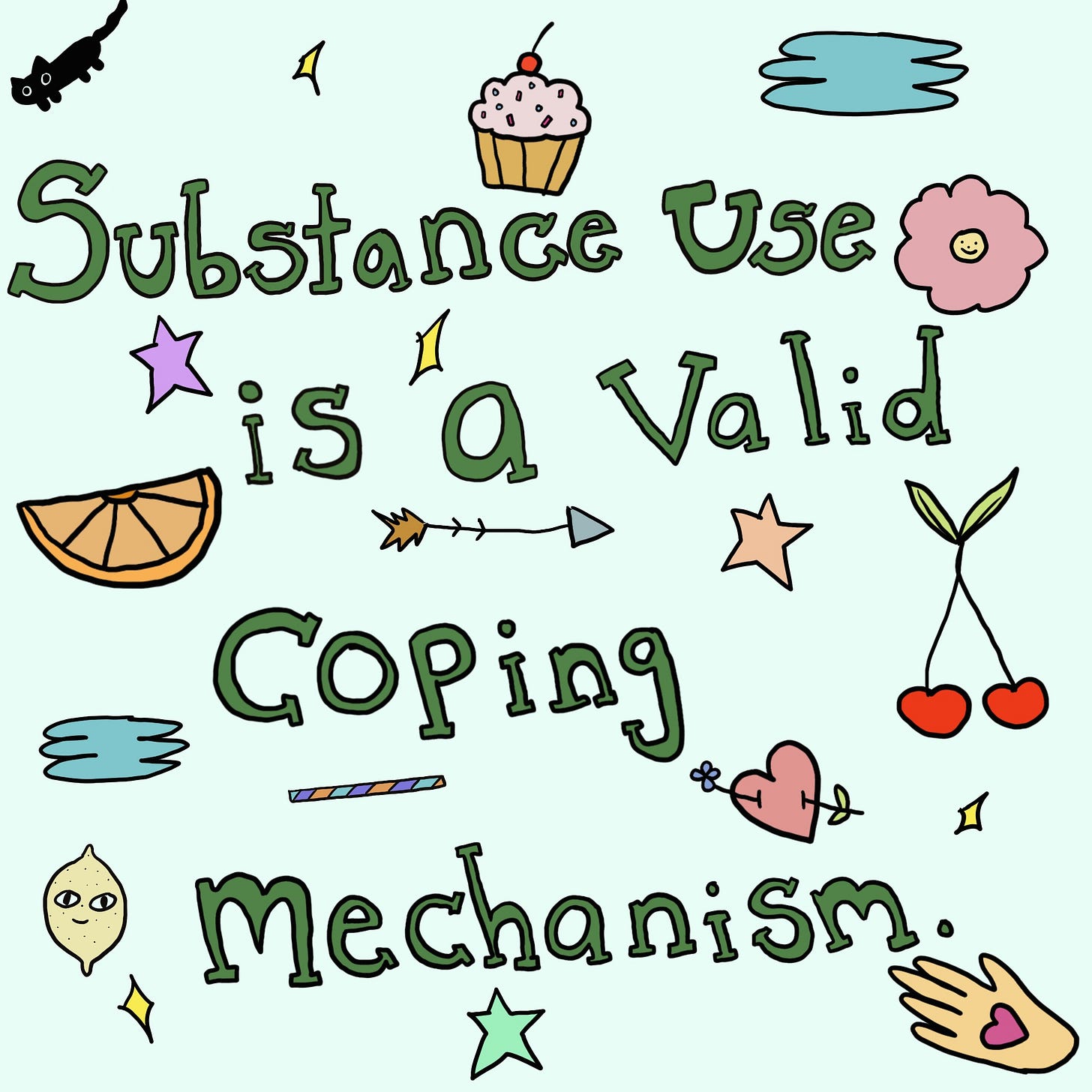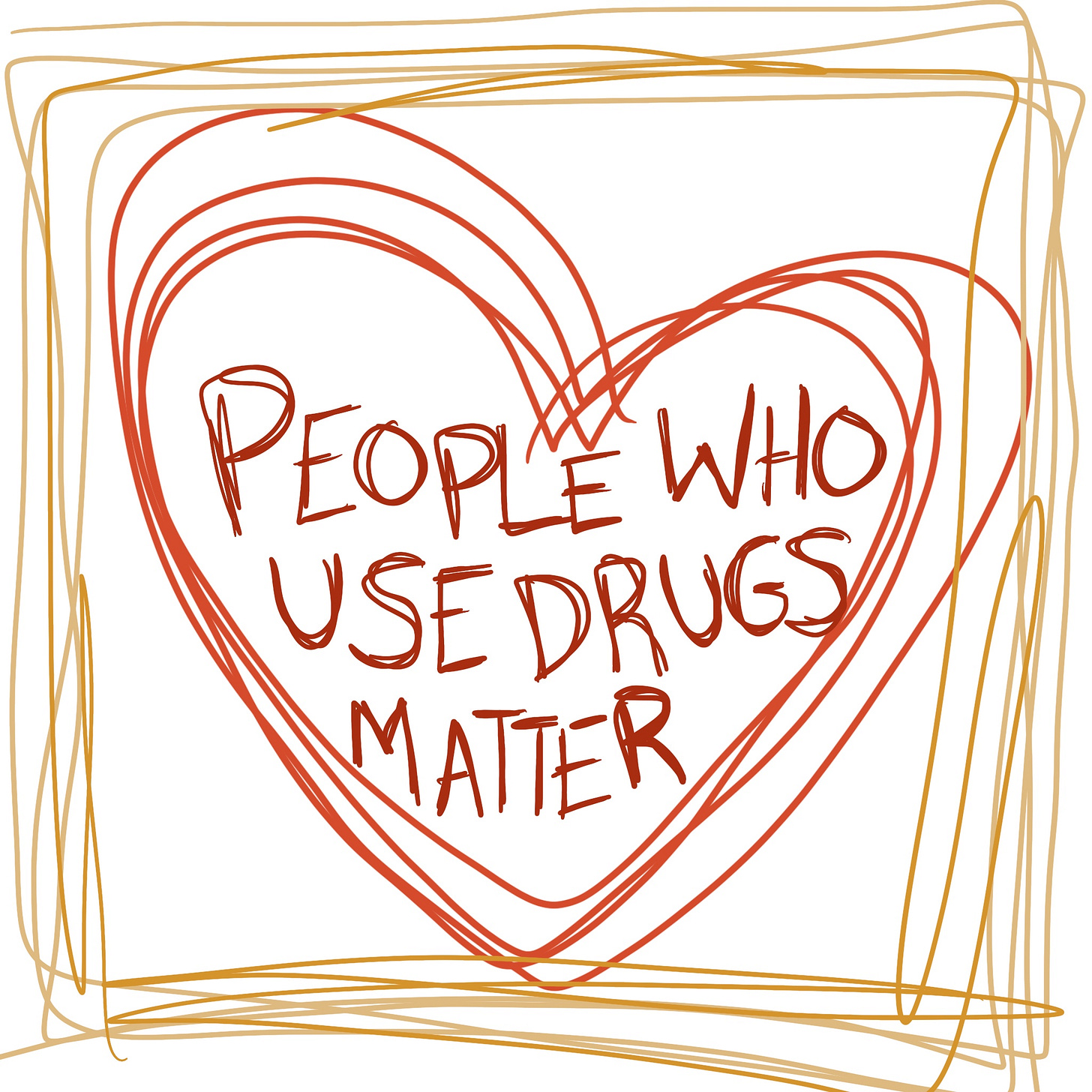people who use drugs actually DO care about themselves
this post was really really REALLY hard to title
I work in a healthcare clinic for the first time in my career, and I have been really taken aback at how much judgment and blame comes from people in this field. If you know anything about me, you probably know that I work with people who use drugs, and I love them. (If you don’t know me, hi, I’m Izzy, and I love people who use drugs!)

I am just over a year into my role in public health, and I am finally ready to talk about one of the most persistent and damaging myths I hear in this field:
People who use drugs don’t care about themselves or their wellbeing.
Every time I hear this sentiment and remember how people look at me when they say it, I feel my chest tighten and my face get hot; it makes me really really upset.
As an experienced professional, I would argue the opposite is actually true. I spend a lot of time with people who use drugs, in both disorganized and regulated ways, and I don’t know that I’ve ever met a group of people more skilled at getting what they need to stay safe and care for themselves in the best ways they are able to.
I think this belief comes from a thought process that sounds something like this:
“We all know that drugs are harmful, and if people cared about themselves and their health they would just stop using them”.
First of all, that is very dumb. Sorry, I don’t have a better way to say it. If your beliefs are that reductive I think you have some very deep inner work to do.
Second, viewing self-care and wellbeing in such a narrow way and discounting the holistic, intersectional, systemic, complex nature of it will only lead to worse outcomes and health for people overall. Describing health as multifaceted is not new- it is well known that we are complex beings with complex, shifting, and sometimes contradicting needs. There is a lot to be balanced in one human, and there are outside forces at work that change how, when, and even IF those balances are possible.
This perception stems from the idea that all drug use is harmful, unimportant, and useless; people use drugs and that causes all of their problems. That is not true, and I would challenge you to consider that drug use does not exist in a vacuum, and people do exist and have complex issues and needs even before drugs are involved. Each situation is unique, and drugs serve many many functions in people’s lives. There are times when staying alive is the ultimate goal, and drugs can play a key role in making that happen. I believe that fighting to stay alive and cope in such a cruel world is a clear indiction of someone valuing themselves and their life very much, not the opposite.
I have met many people whose desire to stay alive and their relentless grip on hope is the very reason they use drugs.
I hear it all the time: I don’t want to die, and this is how I can keep going.
That is a statement of love to the self and a declaration of hope that things could get better. There is no other way I could interpret it.
(If that does not break your heart and solidify the need for better access to holistic care I do not know what will.)
There is also a fundamental misunderstanding about the experience of accessing modern healthcare when you’re someone who uses drugs. All too often, the reason people who use drugs don’t go to the doctor or hospitals is because they are treated terribly. I cannot tell you how many times I have heard the same story; a person who uses drugs has an injury or illness, seeks medical care, is identified as an addict, and is denied treatment, pain management, and dignity. It happens every day. If you were barred from what you needed every time you were sick or hurt and then ridiculed and blamed for your pain, I bet you would stop trying too.
But not being able to access care via traditional medical systems doesn’t mean that people just give up, it means they find other ways. People who suffer from chronic pain or degenerative diseases may use their own supply of drugs in place of prescribed drugs. People who use drugs and suffer wounds may learn how to care for their own injuries and those of their friends so they don’t need to rely on doctors or hospitals. People learn to use narcan and do CPR, they teach each other safer methods for injecting or smoking, they spread information through their networks about changes in the drug supply or sickness going around, they learn about traditional medicine, they find ways to get medications and supplies so their friends who are scared of doctors don’t have to do it themselves, they become skilled at navigating systems designed to hurt and dehumanize them. People build communities and networks of care so they can keep living, despite living in a society that believes they are disposable.
There is some nuance here (as usual); not everyone who uses drugs does so because they’re coping with something painful, sometimes it is literally just because drugs can be very fun. That is great too. It is equally harmful to put everyone who uses drugs in a box to insist they must be hurting or assumed they don’t have access to healthcare and other basic needs services. I am focused on people I meet in my work at a low barrier public health clinic, but I do ask that you hold these nuances in mind.
* * * * * * * * * * * * * * * * * * * * * * * * *
When I have this conversation with people and they start to think about the value in harm reduction and care for people who use drugs, they sometimes come to an idea that is based on another common, catchy saying: “dead people don’t recover”, referring to recovery from substance use. I understand how this can be a helpful framing, but I think perpetuates the idea that a life without illicit drug use is the only kind that is valuable.
I tried to come up with a catchy remake of that phrase, but all I could come up with was this: Dead people are people we don’t get to see and spend time with and get to know and laugh and love with, whether they would ever “recover” or not.
People who use drugs want health and comfort and care just as much as anyone else. The end.







I have a good friend who uses, and I would agree with what you have said here. She cares very much about her health and well being. Sometimes the world just gets to be more than she feels able to handle. She was denied knee surgery after the blood test came back positive. She was so scared about the surgery, it is all she could think to do. I was sorry I wasn't with her the day and night before the surgery day. I am so glad you wrote about this. Your knowledge and insight helps me understand. Thank you!
Whoah! Glad I read this. Thank you for sharing!